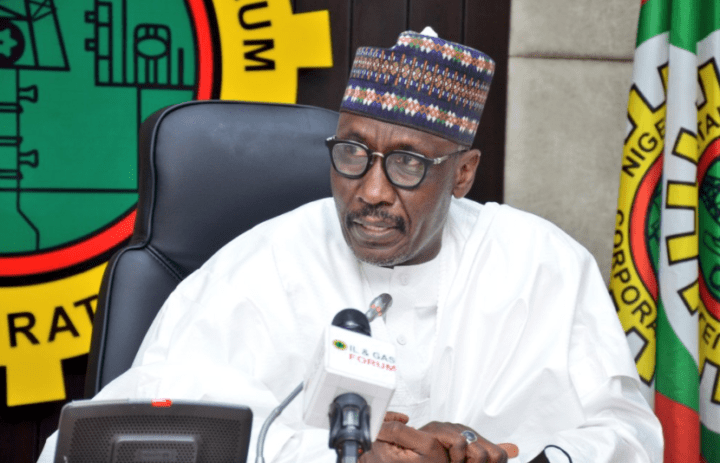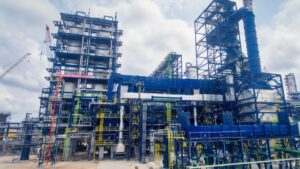


NNPC ends fuel importation, buys from Dangote refinery
The Nigerian National Petroleum Company has ceased importing refined petroleum products and has begun sourcing fuel from local refineries, including the newly operational Dangote Petroleum Refinery.
This shift was confirmed by NNPC’s Group CEO, Mele Kyari, during the Nigerian Association of Petroleum Explorationists conference in Lagos on Monday themed ‘Resolving the Nigerian Energy Trilemma: Energy Security, Sustainable Growth and Affordability’.
Kyari’s statement marks a significant development in Nigeria’s energy sector, especially in light of ongoing debates around fuel pricing.
Some petroleum marketers have claimed that they could still import refined petroleum products and sell them at a price lower than that of the Dangote Refinery, which cost $20 billion to build.
The competition between local refineries and imported fuel could have implications for pricing and the overall sustainability of Nigeria’s energy industry.
In August, President Bola Tinubu said the country spent an average of N2tn on fuel importation monthly.
According to President Tinubu, the introduction of compressed natural gas in Nigeria could save the country over N2 trillion monthly currently spent on importing petrol (PMS) and diesel (AGO). This translates to around N24 trillion annually.
The savings would free up resources that could be redirected into sectors like healthcare and gas education.
Despite being one of the world’s largest oil producers, Nigeria has struggled for years with a lack of local refining capacity, forcing the country to rely on imports for its fuel needs.
Speaking at the NAPE Conference, Kyari disclosed that the NNPC, as of today, is not importing any fuel as it now buys from local refineries.
“Today, NNPC does not import any product, we are taking only from domestic refineries,” he revealed.
Recall, the NNPC was the exclusive off-taker of PMS from the Dangote Refinery, but the Federal Government later allowed other marketers to directly lift products from the refinery.
In response to recent allegations, Kyari, denied claims that the corporation was sabotaging the Dangote refinery.
Kyari addressed accusations suggesting that the NNPC was undermining domestic refining efforts, clarifying that the company had no intention to hinder local refineries.
He emphasized that the media narratives around NNPC’s stance on supporting domestic refining were misleading, stressing that the NNPC remains committed to strengthening the country’s refining capacity and energy security.
“The point is very far from it and I’m going to speak to it straight. We are very proud part-owners of Dangote refinery, no doubt about it. We saw an opportunity that there is a clear market for at least 300,000 barrels of our production; we know that as time moves on, people will start struggling to find markets for their production.
“It will happen, It’s already happening. Oil is found, as you know, in many unexpected locations across the world and people have choices. Therefore we saw an opportunity to log supply to the domestic refinery, not just Dangote but any other refinery that operates in the country, so it was a very informed business decision.
“Therefore, from day one, we knew that it is to our benefit to supply crude oil to the domestic refinery, so we don’t need to be persuaded; we don’t need anyone to talk to us, there is no need for any pressure from the streets for us to do this. We are already doing this,“ he clarified.
Kyari, addressed the call for Nigeria to domesticate its oil production, stating that Nigerian crude is often referred to as “Lamborghini crude” due to its high quality. As a result, the refined products derived from it tend to be more expensive.
The NNPCL boss also revealed that some global traders purchase Nigerian crude but blend it with cheaper, lower-quality fuels in order to reduce costs.
He said, “We should never forget that Nigerian crude is ’Lamborghini crude’, if we choose that every product that we have in this country must come from domestic production, then we must deal with pricing. Otherwise, out there in the global market, everybody buys Nigerian crude and blends it with dirtier crude to process, a lot of you will confirm this. So, no one takes Nigerian crude except one or two refineries that I know. Straight processing of Nigerian crude, nobody does this, because you do have a gap in value if you do this.
“Therefore, as a country, and I believe this strongly also, that we must process all the crude that we produce in the country to the optimum. You can do intermediate products and sell to the market, you are still adding value. You don’t have to sell gasoline that is coming from Nigerian production.
“You can do something different so you can process it domestically, but it’s going to be high quality. As we all know and it’s very clear in the media that we are selling high-quality products, that’s very true but you need not do this. You are driving a Keke-Napep and you want Lamborghini fuel, you do not need it. So, the quality issue is a relative thing, it’s by geography, by location, and we will do everything possible to make sure that we domesticate this.
“Today, NNPC does not import any product, we are taking only from domestic refineries. But I also know that we are working jointly with the government to make sure that we manage the issue around prices if we have to source all our supply from the domestic market. It will be an issue and we are already resolving it. I can confirm that substantial work has been done and this will no longer be an issue.”



